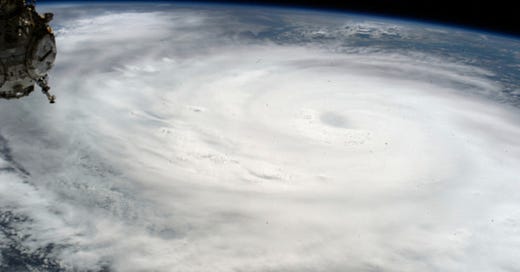If you've been following me for a while, you know storms have been a recurring theme for me. As a lifelong Gulf Coast resident, tropical storms are a fact of life, and taking preparedness seriously serves you well, not just for these more frequent extreme weather events, but for other inevitable personal and professional life events.
This year feels different, though, after a historic storm season last year, where many residents are still working on multi-year recovery efforts. Many had never heard of the FEMA 50% rule until soon after Hurricane Helene hit - and many cases are still being reviewed to determine what affordable options are left for residents who want to stay while the next hurricane season has already begun. Per FEMA's Fact Sheet on Substantial Damage:
"If local officials determine that a residential structure has been substantially damaged – meaning the cost to repair the home is equal to or greater than 50 percent of its market value before the disaster damage – the owner generally has three options to bring the structure into compliance.
Elevate the building to a height determined by local officials.
Relocate the structure outside the floodplain.
Demolish the structure."
Unfortunately, none of these options are inexpensive, quick, or simple to do. And they are compounded by the ongoing insurance crisis in many areas.
Know Your Risk
As part of FEMA's National Risk Index, a "Hurricane Risk Index score and rating represent a community's relative risk for Hurricanes when compared to the rest of the United States." While there are many more perils to consider when assessing overall risk, like droughts, tornados, lightning, and other hazards, keeping things in perspective goes a long way in prioritizing your short-term and long-term risk management approach.
Prepare & Plan
There are plenty of detailed checklists available to remind residents of what they may need to prepare for storms, whether they are staying to ride it out or evacuating. Some of these decisions are much easier to make ahead of time based on objective criteria for the conditions and forecast. Some residents may choose to evacuate for anything above a CAT 3 landing within 100 miles, while others wait for official evacuation orders to be issued.
I've learned not to question the criteria people use to stay or go, because there are so many variables that can impact one's ability to stay in relative safety while still in harm's way. Ask any Houstonian about their experience during Hurricane Rita, and they will be quick to remind you evacuations can sometimes be even more disruptive and dangerous than just staying put. You need a pretty good head start to head out on the major evacuation routes and avoid the inevitable gridlock with widespread evacuation orders like that. The experience will definitely factor in to any future plans, especially if there are any pets or special needs considerations involved.
Manage the Stress
The increasing strength and frequency of recent storms has made things noticeably more stressful than in previous seasons. Local news sources tend to be more measured in their assessments than regional or national sources that focus on the worst case scenarios that can be more likely to induce panic than motivate practical preparedness.
Repeated exposure to hurricanes and their aftermath can take a heavy toll on survivors.
As the storms become more severe, so do the mental health consequences. In fact, the storms do more widespread damage to minds than to bodies, the article argues: “Simply stated, more people are affected psychologically than medically after any given hurricane.” -- NOAA NCEI Researchers, May 2020
Preparing not just for the physical damage, but also the emotional toll these storms can take is critical towards building the resilience needed to support a quicker recovery. For some, the hurricane party tradition is a key part of that preparation. It's not meant to downplay or minimize the potential risks, but an opportunity to find a way to decompress during stressful events that are beyond our control.
For others, esp. with preexisting conditions that can be triggered during and after a storm, hurricanes can lead to "new-onset major depression, generalized anxiety disorder, and post-traumatic stress disorder (PTSD). People with substance-use disorders may increase consumption or relapse if they are in recovery."
The Atlantic hurricane season may just be starting today, but for many Gulf Coast residents, the last season still hasn't ended. Stay safe and be kind.
Reference
Cornett, Brandon. "Florida Home Insurance Crisis Explained: Spring 2025 Update," Home Buying Institute, Apr. 20, 2025, at https://homebuyinginstitute.com/mortgage/florida-home-insurance-crisis/
FEMA, "FACT SHEET: What Does “Substantial Damage” Mean?" Nov. 20, 2018, at https://www.fema.gov/press-release/20250121/fact-sheet-what-does-substantial-damage-mean (Last updated May 2, 2023)
FEMA, "Features of Flood Insurance Rate Maps in Coastal Areas," at https://www.fema.gov/flood-maps/coastal/insurance-rate-maps (Last updated May 24, 2021)
FEMA, "Hurricane Risk Index," at https://hazards.fema.gov/nri/hurricane
FEMA, "National Risk Index Technical Documentation," March 2025, at https://www.fema.gov/sites/default/files/documents/fema_national-risk-index_technical-documentation.pdf
FEMA, "Substantial Damage Quick Guide," at https://www.fema.gov/fact-sheet/substantial-damage-quick-guide (Last updated Jan. 21, 2025)
Florida Division of Emergency Management, "Know Your Zone," https://www.floridadisaster.org/knowyourzone/
NOAA, "Hurricane Preparedness," Feb. 28, 2025, at https://www.noaa.gov/hurricane-prep
NOAA, "Hurricanes Take Heavy Toll on Mental Health of Survivors," May 8, 2020, at https://www.ncei.noaa.gov/news/hurricanes-take-heavy-toll-mental-health-survivors
Paluska, Michael. "Will your flood damaged Florida home get bulldozed? FEMA's 50% rule explained," ABC Action News, Oct. 4, 2024, at https://www.abcactionnews.com/news/local-news/will-your-flood-damaged-florida-home-get-bulldozed-floridas-50-rule-explained
Phillips, Denis. 2025 HURRICANE & TROPICAL STORM UPDATES, May 30, 2025, at https://www.facebook.com/groups/476274159411304/posts/2467620973609936/
Ready.gov, "Prepare Your Pets for Disasters," at https://www.ready.gov/pets (Last updated June 3, 2024)
Taylor, Langston, Ivy Nyayieka, Shreya Vuttaluru, and Jack Prator, "For Tampa Bay, Helene was the worst storm in a century," Tampa Bay Times, Sep. 28, 2024, at https://www.tampabay.com/hurricane/2024/09/28/tampa-bay-helene-was-worst-storm-century/ (Last updated Jan. 22, 2025)
Wikipedia, "Atlantic Hurricane Season," at https://en.wikipedia.org/wiki/Atlantic_hurricane_season
--, "Hurricane Helene," at https://en.wikipedia.org/wiki/Hurricane_Helene
--, "Hurricane Party," at https://en.wikipedia.org/wiki/Hurricane_party
--, "Hurricane Rita," at https://en.wikipedia.org/wiki/Hurricane_Rita
--, "Hurricane Rita evacuations," at https://en.wikipedia.org/wiki/Hurricane_Rita_evacuation
Zakhari, Nivine. "Transform to Perform: Riding out the Storm," June 9, 2016, at https://www.linkedin.com/pulse/transform-perform-riding-out-storm-nivine-k-zakhari/







